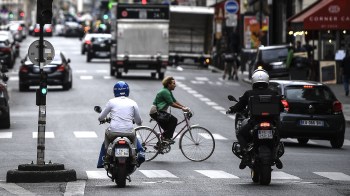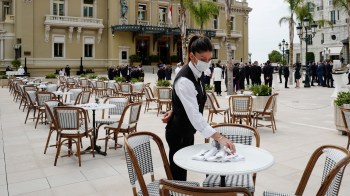Sarkozy strives for French BBC
TEXT OF STORY
KAI RYSSDAL: The French are known for their willingness to take to the streets in defense of their cause. Late last year it was a nationwide transit strike over changes to public pension plans. Last week it was strikes to protest a plan to ban commercials on public television. President Nicholas Sarkozy says he wants to improve public broadcasting, create a sort of French BBC. Why might people want commercials on public TV?
Here’s John Laurenson from Paris.
JOHN LAURENSON: When you flip from France’s main private TV channel, TF-1, to its main public competitor, France 2, you should be able to tell the difference. There’s no reality TV on the public channel, more dramas. But there’s one time you definitely can’t tell them apart — commercial breaks. French viewers pay $150 a year for a license to watch public television. During the 20 minutes of ads that France 2 broadcasts between the 8:00 news and the main evening feature, they may well wonder why.
Olivier Milot covers television for entertainment magazine Telerama. He says French public TV viewers are getting the worst of both worlds. They have to sit through hours of ads and pay the license fee. Worse still, to get those advertising dollars, the mainstream public channels have to chase ratings, just as the private channels do, but that’s about to end. Sarkozy recently set up a commission to decide how best to do away with advertising on public channels. Mathieu Gallet, TV advisor to the Minister of Culture, says that under Sarkozy’s plan, French public television will be able to rival the high quality of the BBC. The British broadcaster doesn’t have ads on its domestic broadcasts.
MATHIEU GALLET: I think that’s a good opportunity for the French TV in France to take more risks on new programs, new formats, working with new producers, leaving the time to the new programs to find their audiences.
The move is expected to cost public broadcasters $1.8 billion in lost advertising and new programming. Labor unions fear the government will fail to honor its promise to provide that money and maintain public broadcasting. Earlier this month, they staged the biggest strike French broadcasting has seen in 30 years. The unions also don’t like that much of the lost advertising will land at the private channels, the biggest of which is owned by the billionaire Martin Bouygues, a close friend of Sarkozy’s, and there’s a good deal of scepticism on the streets Paris.
LAURENSON: Is it a good idea, you think, to get rid of advertising on public television in France?
MAN ON THE STREET: Well, it could be if it was not this government.
LAURENSON: You suspect the motives of Mr. Sarkozy?
MAN: Yeah, I think he’s going to give the publicity market to his friends from the other private channels.
The government says it’s still figuring out how it’s going to pay for the reform, maybe new taxes on TV advertising revenues and/or the profits of Internet and phone service providers, a growing medium for television. Taxes would, of course, hit the private channels, but they expect the increase in ad revenues will more than balance that out. Whatever happens, the deadline’s coming up fast. Sarkozy wants his new commercial-free TV up and running this time next year.
In Paris , I’m John Laurenson for Marketplace.
There’s a lot happening in the world. Through it all, Marketplace is here for you.
You rely on Marketplace to break down the world’s events and tell you how it affects you in a fact-based, approachable way. We rely on your financial support to keep making that possible.
Your donation today powers the independent journalism that you rely on. For just $5/month, you can help sustain Marketplace so we can keep reporting on the things that matter to you.


















